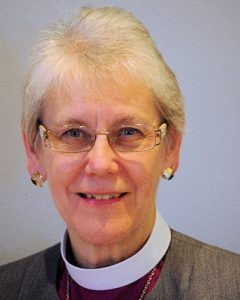As I write this, we are still in the midst of the COVID-19 lockdown.
A skiff of snow lies on the ground outside my window. Easter is behind us and ongoing uncertainty lies ahead. As you read this, our lives may already be very different. In the least, spring will be fully upon us, warming our bodies and encouraging our hearts with emerging new life.

We have experienced a profound disruption in our lives, our communities and our church. Grief has accompanied us as we faced many losses, perhaps including the devastating deaths of family and friends to the virus. The economy will require months of recovery, and charities, including faith communities, face unstable futures. The crisis uncovered gaps and inequities in our life together as our safety depended on those willing to sacrificially work while we stayed home and realized that those society often values least were essential—and deserve better pay and more respect.
We face new theological questions about the nature of the Eucharist and the always-present question: Where is God in the midst of suffering? We discovered that technology cannot fully replace gathering as a community as we ached to be together in Holy Week, to remember and celebrate. We discovered the fragility of life as one invisible virus could bring the entire world to a grinding halt in every aspect of life.
Now we are called to pick up the pieces of shattered expectations and rebuild. Just as those who have survived a tornado or earthquake might consider how to rebuild better, so we too enter a time to ask questions. What have we learned? About the mission of God? About what is essential and what might be released? About what needs to change? About ourselves?
We have certainly learned that we can continue to connect with one another using available technology. Meetings from coast to coast to coast were able to happen without the participants leaving home. Our carbon footprint has been reduced, and work has continued.
We learned new skills on Zoom, Skype and conference calls. We can be connected for online worship with isolated communities and people. Some who might never consider entering a church building were able to drop in through online worship. Some clergy reported deeper relationships with parishioners as they connected by phone directly, including with those who had been disconnected for some time. We rediscovered the power of the daily office, shared online or through website resources. Families prayed together. And the primate joined worship or confirmation and young adult classes for conversation and questions from St. John’s, N.L., to Caledonia; from Algoma to Niagara to Montreal.
We also discovered afresh that without our church buildings, our gathered worship, our coffee hours and Bible study groups, God is with us. Stripped of the usual supports for our faith, we are invited to meet God in our homes, in our grief and lamentation, in our joy and sorrow, in our longing for the familiar, and in our fears and anxiety. God is here—now and always—risen in the resurrection of Easter. God is here in each other—through a window, across a driveway, over the phone or internet, in acts of kindness and generosity, in compassion and caring. God is here—and, whatever happens in the future, we know we are not alone. The church is wherever God’s people proclaim this Good News.
Remember the early disciples who left behind their vocations to follow Jesus. They entered into the loss of every expectation they had through the crucifixion and then embraced the radical possibility of the resurrection to be sent into the world with nothing but the Good News. Peter and John greet a lame beggar with these words: “I have no silver or gold, but what I have I give you; in the name of Jesus Christ of Nazareth, stand up and walk” (Acts 3:6). And they allowed the Holy Spirit to fill them with new power and energy to proclaim the Good News to strangers in the streets at Pentecost (Acts 2).
So whatever lies ahead in the choices and decisions we need to make, we go into them in the presence of God, guided by the Holy Spirit, in the name and power of Jesus Christ. We go into them with a faith strengthened and tested through adversity. We enter it with possible trepidation—and also with excitement at the adventure that lies before us, as it did the first disciples.
For a joyful celebration of Pentecost and of our unity in diversity with our Evangelical Lutheran Church in Canada colleagues and Indigenous Anglicans, see our Pentecost video being launched on May 31 at anglicanlutheran.ca/pentecost.


